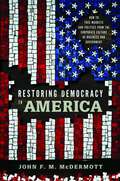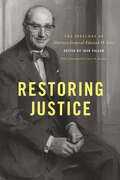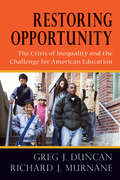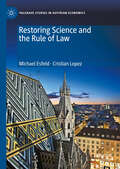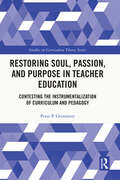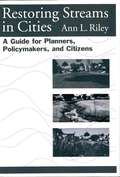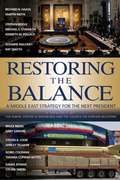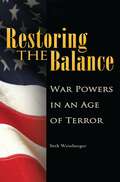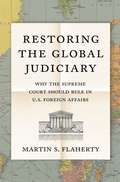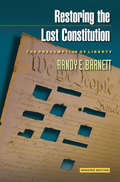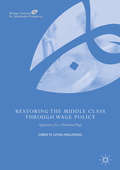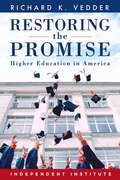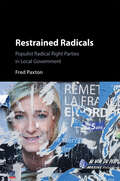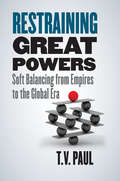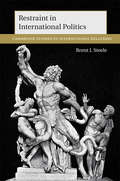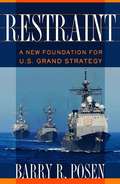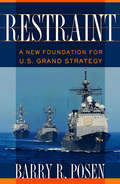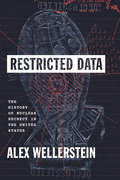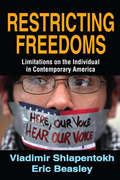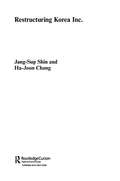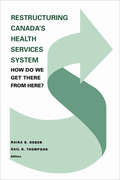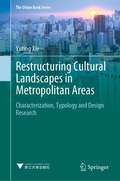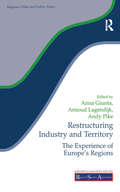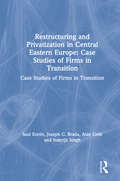- Table View
- List View
Restoring Democracy to America: How to Free Markets and Politics from the Corporate Culture of Business and Government
by John F. McDermottIf the current economic malaise accomplishes nothing else, it should help awaken us all to the realization that our country has been on a path of self-destructive behavior for several decades—a reversal of the progressive path that had made major gains in economic and political equality for a large majority of the U.S. population starting in the 1870s. It is John McDermott’s purpose in this ambitious book to explain why that reversal happened, how society has changed in dramatic ways since the 1960s, and what we can do to reverse this downward spiral. In Part 1 he endeavors to lay out the overall narrative of change from the 1960s to the present, emphasizing how a novel social structure came to be developed around corporate America to form what he calls “corporate society.” Part 2 analyzes what the nature of this corporate society is, how it is a special type of “fabricated” structure, and why it came to dominate society generally, eventually including the government and university systems, which themselves became increasingly corporatized. The aim of Part 3 is to outline a path of reform that can, if all its parts can be integrated sufficiently to be effective, put us on the path to restarting the progressive movement.
Restoring Justice: The Speeches of Attorney General Edward H. Levi
by Edward H. LeviIn the wake of Watergate, Gerald Ford appointed eminent lawyer and scholar Edward H. Levi to the post of attorney generalOCoand thus gave him the onerous task of restoring legitimacy to a discredited Department of Justice. Levi was famously fair-minded and free of political baggage, and his inspired addresses during this tumultuous time were critical to rebuilding national trust. They reassured a tense and troubled nation that the Department of Justice would act in accordance with the principles underlying its name, operating as a nonpartisan organization under the strict rule of law. For "Restoring Justice," Jack Fuller has carefully chosen from among LeviOCOs speeches a selection that sets out the attorney generalOCOs view of the considerable challenges he faced: restoring public confidence through discussion and acts of justice, combating the corrosive skepticism of the time, and ensuring that the executive branch would behave judicially. Also included are addresses and Congressional testimonies that speak to issues that were hotly debated at the time, including electronic surveillance, executive privilege, separation of powers, antitrust enforcement, and the guidelines governing the FBIOComany of which remain relevant today. aaaaaaaaaaaaaaaaaa Serving at an almost unprecedentedly difficult time, Levi was among the most admired attorney generals of the modern era. Published here for the first time, the speeches in "Restoring Justice" offer a superb sense of the man and his work.
Restoring Opportunity: The Crisis of Inequality and the Challenge for American Education
by Richard J. Murnane Greg J. DuncanIn this landmark volume, Greg J. Duncan and Richard J. Murnane lay out a meticulously researched case showing how--in a time of spiraling inequality--strategically targeted interventions and supports can help schools significantly improve the life chances of low-income children.A crowning contribution from two leading economists in the field of education, Restoring Opportunity is a passionate call to action on behalf of the young people on whom our nation's future depends. This book is a copublication with the Russell Sage Foundation."Duncan and Murnane provide a no-nonsense view of the growing educational gap between the haves and the have-nots in America. They also scour the landscape to find promising solutions that provide hope for better outcomes in the future. This is a thoughtful book that should be read with the care it merits."--Joel Klein, CEO of Amplify, and former chancellor, New York City Department of Education"This thorough examination of our public school system provides a clear picture of some of the toughest challenges--particularly those facing low-income students--and the directions in which we need to go to fix them. This book should be on the desk of every educator and policy maker in America so we can begin to change the odds for all of America's children."--Geoffrey Canada, president and CEO, Harlem Children's Zone"Anyone who cares about improving schools should read this book. Duncan and Murnane offer detailed case studies of effective programs to improve schools that can boost the life chances of disadvantaged children. The authors present a careful analysis, grounded in economics and education, of the ways to make better schooling available to all of the nation's low-income children."--David K. Cohen, John Dewey Collegiate Professor of Education and professor of public policy, University of Michigan
Restoring Opportunity: The Crisis of Inequality and the Challenge for American Education
by Richard J. Murnane Greg J. DuncanIn this landmark volume, Greg J. Duncan and Richard J. Murnane lay out a meticulously researched case showing how—in a time of spiraling inequality—strategically targeted interventions and supports can help schools significantly improve the life chances of low-income children. The authors offer a brilliant synthesis of recent research on inequality and its effects on families, children, and schools. They describe the interplay of social and economic factors that has made it increasingly hard for schools to counteract the effects of inequality and that has created a widening wedge between low- and high-income students.Restoring Opportunity provides detailed portraits of proven initiatives that are transforming the lives of low-income children from prekindergarten through high school. All of these programs are research-tested and have demonstrated sustained effectiveness over time and at significant scale. Together, they offer a powerful vision of what good instruction in effective schools can look like. The authors conclude by outlining the elements of a new agenda for education reform.Restoring Opportunity is a crowning contribution from these two leading economists in the field of education and a passionate call to action on behalf of the young people on whom our nation&’s future depends.Copublished with the Russell Sage Foundation
Restoring Science and the Rule of Law (Palgrave Studies in Austrian Economics)
by Michael Esfeld Cristian LopezScience and the rule of law are the two pillars of modernity. Even though both result from the attempt to employ reason to limit the exercise of power in the scientific and the political sphere, they bear in themselves the germs of their own destruction: scientism and welfare totalitarianism. This book examines a trend towards a new, specifically postmodern totalitarianism, namely a regime of “actually existing postmodernism” that is based on the collusion of four elements: (i) scientism and its political use, (ii) intellectual postmodernism, (iii) welfare states, and (iv) crony capitalism. The book then shows a way out by utilising the philosophy of Descartes and Kant, the social-normative turn in the 20th century, and the resources of Austrian libertarianism from Hayek and Popper to Mises, Rothbard and Hoppe. These intellectual resources lay the ground for a New Enlightenment and an open society shaped by a free science and voluntary cooperation under the rule of law. Restoring Science and the Rule of Law is essential reading for philosophers of science and for political theorists interested in the foundations of the rule of law.
Restoring Soul, Passion, and Purpose in Teacher Education: Contesting the Instrumentalization of Curriculum and Pedagogy (Studies in Curriculum Theory Series)
by Peter P. GrimmettThis text both challenges and traces the development of a culture of regulation, standardization, performativity, and governmentality evident in Anglophone teaching practice and education. Framed by a brief history of teacher education research and policy in North America over the last six decades, the text argues that the instrumentalization of curriculum and pedagogy has robbed teachers of their pedagogical soul, passion, and purpose. Using a conceptual model, Grimmett forges a pathway for teachers to adopt a soulful way forward in professional practice, individually and collectively enhancing autonomy over programs, and protecting the public trust placed in them as educators. This text will benefit researchers, academics, and educators with an interest in teachers and teacher education, educational policy and politics, and curriculum thinking and enactment more broadly. Those specifically interested in pedagogy, educational change and reform, and the philosophy of education will also benefit from this book.
Restoring Streams in Cities: A Guide for Planners, Policymakers, and Citizens
by Luna B. Leopold Ann L. RileyConventional engineering solutions to problems of flooding and erosion are extremely destructive to natural environments. Restoring Streams in Cities presents viable alternatives to traditional practices that can be used both to repair existing ecological damage and to prevent such damage from happening.Ann L. Riley describes an interdisciplinary approach to stream management that does not attempt to "control" streams, but rather considers the stream as a feature in the urban environment. She presents a logical sequence of land-use planning, site design, and watershed restoration measures along with stream channel modifications and floodproofing strategies that can be used in place of destructive and expensive public works projects. She features examples of effective and environmentally sensitive bank stabilization and flood damage reduction projects, with information on both the planning processes and end results. Chapters provide: background needed to make intelligent choices, ask necessary questions, and hire the right professional help history of urban stream management and restoration information on federal programs, technical assistance and funding opportunities in-depth guidance on implementing projects: collecting watershed and stream channel data, installing revegetation projects, protecting buildings from overbank stream flowsProfusely illustrated and including more than 100 photos, Restoring Streams in Cities includes detailed information on all relevant components of stream restoration projects, from historical background to hands-on techniques. It represents the first comprehensive volume aimed at helping those involved with stream management in their community, and describes a wealth of options for the treatment of urban streams that will be useful to concerned citizens and professional engineers alike.
Restoring the Balance: A Middle East Strategy for the Next President
by Richard N. Haass Martin IndykThe forty-fourth U.S. president will face a series of critical, complex, and interrelated challenges in the Middle East that will demand immediate attention. George W. Bush's model of regime change and democratization will no longer suit the changing circumstances likely to confront the next administration. Fresh ideas, nonpartisan analysis, and clear-eyed recommendations are needed, and this authoritative book heeds the call.
Restoring the Balance: War Powers in an Age of Terror
by Seth WeinbergerSince 9/11, one of the most dominant issues in American politics has been: what exactly is a war on terror and who is in charge of it? Previous books on this topic have fallen off the horse on either side: on the right, making military actions under the Bush administration equal to previous declared wars and ceding too much war-making power to the presidency or on the left, requiring congressional approval for any national security steps at all, contradicting much of American historical precedent. Weinberger presents a novel understanding of the Declare War clause of the Constitution (Article 1, Section 8), filtering it through the AUMFs passed by Congress since 9/11 and concluding that the Presidency has wide latitude and autonomy in the overseas theaters, but not on the domestic front.
Restoring the Global Judiciary: Why the Supreme Court Should Rule in U.S. Foreign Affairs
by Martin S. FlahertyWhy there should be a larger role for the judiciary in American foreign relationsIn the past several decades, there has been a growing chorus of voices contending that the Supreme Court and federal judiciary should stay out of foreign affairs and leave the field to Congress and the president. Challenging this idea, Restoring the Global Judiciary argues instead for a robust judicial role in the conduct of U.S. foreign policy. With an innovative combination of constitutional history, international relations theory, and legal doctrine, Martin Flaherty demonstrates that the Supreme Court and federal judiciary have the power and duty to apply the law without deference to the other branches.Turning first to the founding of the nation, Flaherty shows that the Constitution’s original commitment to separation of powers was as strong in foreign as domestic matters, not least because the document shifted enormous authority to the new federal government. This initial conception eroded as the nation rose from fledgling state to superpower, fueling the growth of a dangerously formidable executive that today asserts near-plenary foreign affairs authority. Flaherty explores how modern international relations makes the commitment to balance among the branches of government all the more critical and he considers implications for modern controversies that the judiciary will continue to confront.At a time when executive and legislative actions in the name of U.S. foreign policy are only increasing, Restoring the Global Judiciary makes the case for a zealous judicial defense of fundamental rights involving global affairs.
Restoring the Lost Constitution: The Presumption of Liberty - Updated Edition
by Randy E. BarnettThe U.S. Constitution found in school textbooks and under glass in Washington is not the one enforced today by the Supreme Court. In Restoring the Lost Constitution, Randy Barnett argues that since the nation's founding, but especially since the 1930s, the courts have been cutting holes in the original Constitution and its amendments to eliminate the parts that protect liberty from the power of government. From the Commerce Clause, to the Necessary and Proper Clause, to the Ninth and Tenth Amendments, to the Privileges or Immunities Clause of the Fourteenth Amendment, the Supreme Court has rendered each of these provisions toothless. In the process, the written Constitution has been lost. Barnett establishes the original meaning of these lost clauses and offers a practical way to restore them to their central role in constraining government: adopting a "presumption of liberty" to give the benefit of the doubt to citizens when laws restrict their rightful exercises of liberty. He also provides a new, realistic and philosophically rigorous theory of constitutional legitimacy that justifies both interpreting the Constitution according to its original meaning and, where that meaning is vague or open-ended, construing it so as to better protect the rights retained by the people. As clearly argued as it is insightful and provocative, Restoring the Lost Constitution forcefully disputes the conventional wisdom, posing a powerful challenge to which others must now respond. This updated edition features an afterword with further reflections on individual popular sovereignty, originalist interpretation, judicial engagement, and the gravitational force that original meaning has exerted on the Supreme Court in several recent cases.
Restoring the Middle Class through Wage Policy: Arguments For A Minimum Wage (Binzagr Institute For Sustainable Prosperity Ser.)
by Oren M. Levin-WaldmanThis book delivers a fresh and fascinating perspective on the issue of the minimum wage. While most discussions of the minimum wage place it at the center of a debate between those who oppose such a policy and argue it leads to greater unemployment, and those who favor it and argue it improves the economic well-being of low-income workers, Levin-Waldman makes the case for the minimum wage as a way to improve the well-being of middle-income workers, strengthen the US economy, reduce income inequality, and enhance democracy. Making a timely and original contribution to the defining issues of our time—the state of the middle class, the problem of inequality, and the crisis of democratic governance—Restoring the Middle Class through Wage Policy will be of interest to students and researchers considering the impact of such approaches across the fields of public policy, economics, and political science.
Restoring the Promise: Higher Education in America
by Richard K. VedderHigher education in America is in crisis. Costs are too high, learning is too little, and the payoff to students and society is increasingly problematic. In Restoring the Promise, Richard Vedder shows how the precarious position of colleges and universities results from a mostly unsuccessful expansion of governmental involvement in the academy, especially at the federal level.The book examines today&’s most serious issues in higher education, including free speech and academic freedom; tuition and other costs; culture and curricula; governance; gender, race and diversity; due process; admissions; student loans; and much more. It diagnoses problems and identifies solutions. For example, the total cost of college per student in the United States is now higher than in any other country. When combining the monetary costs of college with the opportunity costs of losing years of labor to the economy, the true cost of higher education to American society well exceeds one trillion dollars annually. Yet, despite American higher education&’s immense price tag, students are learning less than ever before and continue to be underemployed. The book discusses the three &“I&’s&” of university reform: information, incentives, and innovation. Without information, it is impossible for taxpayers and governing authorities to ensure that public education spending truly furthers the broader interests of society rather than the narrow interests of faculty and administrators. Shaping incentives for management would help to reduce costs and improve quality. Business practices such as Responsibility Centered Management (RCM), for example, allow profit to motivate efficiency and encourage learning outcomes. And expanding the use of innovation in technology and open online courses, along with relinquishing old rules such as tenure and three-month summer vacations, offer new hope for institutions of higher education. The book discusses such additional reforms as the following: Ending or revising the federal student financial aid program Giving departments or even professors a share of overall revenue based on student enrollments in their classes. Departments or professors would then be required to pay their share of travel, building rental, maintenance, utilities, and other such costs from the revenues they receive Providing earnings data on former students by college five, ten or fifteen years after matriculation. Prospective students (and parents) as well as lawmakers and oversight officials would be assisted regarding school successes and failures Increasing faculty teaching loads Instituting three-year degrees and year-round instruction Ending discrimination against for-profit schools Ending grade inflation Ending speech codes and other barriers to academic freedom Ending affirmative action and related diversity programs And more...
Restrained Radicals: Populist Radical Right Parties in Local Government
by Fred PaxtonThe entry of populist radical right parties into positions of power has generated anxious debate regarding the potential consequences for liberal democracy. Their activities in local government, however, have been largely overlooked. This comparative analysis of populist radical right-led local governments in Western Europe makes an important contribution to a crowded field through the study of so far uncharted terrain. Comparing cases in Austria, France, Italy and Switzerland, Fred Paxton details the extent of ideological impact in local politics and the various restraints that are placed on their radicalism. Drawing from a wealth of new data, he explains the varying degree of radicalism with recourse to two principal factors: the constraints of the local government institutional setting and the national party leaders' strategies towards the local arena. This book broadens our understanding of populist radical right parties in Western Europe and the sub-national processes through which they are developing.
Restraining Great Powers: Soft Balancing from Empires to the Global Era
by T. V. PaulHow subtler forms of balance-of-power politics can help states achieve their goals against aggressive powers without wars or arms races At the end of the Cold War, the United States emerged as the world’s most powerful state, and then used that power to initiate wars against smaller countries in the Middle East and South Asia. According to balance†‘of†‘power theory—the bedrock of realism in international relations—other states should have joined together militarily to counterbalance the U.S.’s rising power. Yet they did not. Nor have they united to oppose Chinese aggression in the South China Sea or Russian offensives along its Western border. This does not mean balance†‘of†‘power politics is dead, argues renowned international relations scholar T.V. Paul, but that it has taken a different form. Rather than employ familiar strategies such as active military alliances and arms buildups, leading powers have engaged in “soft balancing,” which seeks to restrain threatening powers through the use of international institutions, informal alignments, and economic sanctions. Paul places the evolution of balancing behavior in historical perspective from the post-Napoleonic era to today’s globalized world.
Restraint in International Politics (Cambridge Studies in International Relations #151)
by Brent J. SteeleThe first comprehensive examination of restraint in international politics, considered across a range of psychological, social, political, and institutional contexts as a political process, device, and strategy. Surveying how restraint has been understood in international relations and political theory, with focus given to Aristotle and Machiavelli, Steele utilises Carl Jung's theories of complexes and the libido to broaden the conceptual definition of restraint as a phenomenon that is not only individual and inward-looking, but also relational and societal. Exploring its development, uses, expressions and challenges through history and in contemporary times, this book analyses the politics of restraint in processes of security, political economy, foreign policy and global public health. Situating restraint alongside similar concepts such as moderation, containment, and constraint, Steele asks against what, and from what, are we restraining ourselves, who authorizes restraint, and what are the risks and rewards (both ethical and practical). Steele concludes with a balanced political and normative argument for restraint going forward.
Restraint: A New Foundation for U.S. Grand Strategy
by Barry R. PosenThe United States, Barry R. Posen argues in Restraint, has grown incapable of moderating its ambitions in international politics. Since the collapse of Soviet power, it has pursued a grand strategy that he calls "liberal hegemony," one that Posen sees as unnecessary, counterproductive, costly, and wasteful. Written for policymakers and observers alike, Restraint explains precisely why this grand strategy works poorly and then provides a carefully designed alternative grand strategy and an associated military strategy and force structure. In contrast to the failures and unexpected problems that have stemmed from America's consistent overreaching, Posen makes an urgent argument for restraint in the future use of U. S. military strength. After setting out the political implications of restraint as a guiding principle, Posen sketches the appropriate military forces and posture that would support such a strategy. He works with a deliberately constrained notion of grand strategy and, even more important, of national security (which he defines as including sovereignty, territorial integrity, power position, and safety). His alternative for military strategy, which Posen calls command of the commons, focuses on protecting U. S. global access through naval, air, and space power, while freeing the United States from most of the relationships that require the permanent stationing of U. S. forces overseas. "
Restraint: A New Foundation for U.S. Grand Strategy
by Barry R. PosenThe United States, Barry R. Posen argues in Restraint, has grown incapable of moderating its ambitions in international politics. Since the collapse of Soviet power, it has pursued a grand strategy that he calls "liberal hegemony," one that Posen sees as unnecessary, counterproductive, costly, and wasteful. Written for policymakers and observers alike, Restraint explains precisely why this grand strategy works poorly and then provides a carefully designed alternative grand strategy and an associated military strategy and force structure. In contrast to the failures and unexpected problems that have stemmed from America's consistent overreaching, Posen makes an urgent argument for restraint in the future use of U.S. military strength.After setting out the political implications of restraint as a guiding principle, Posen sketches the appropriate military forces and posture that would support such a strategy. He works with a deliberately constrained notion of grand strategy and, even more important, of national security (which he defines as including sovereignty, territorial integrity, power position, and safety). His alternative for military strategy, which Posen calls "command of the commons," focuses on protecting U.S. global access through naval, air, and space power, while freeing the United States from most of the relationships that require the permanent stationing of U.S. forces overseas.
Restricted Data: The History of Nuclear Secrecy in the United States
by Alex Wellerstein“Groundbreaking . . . Wellerstein peels back the layers of the nuclear onion to reveal a rich debate about what should be kept secret and why.” —NatureThe first full history of US nuclear secrecy, from its origins in the late 1930s to our post–Cold War present.The American atomic bomb was born in secrecy. From the moment scientists first conceived of its possibility to the bombings of Hiroshima and Nagasaki and beyond, there were efforts to control the spread of nuclear information and the newly discovered scientific facts that made such powerful weapons possible. The totalizing scientific secrecy that the atomic bomb appeared to demand was new, unusual, and very nearly unprecedented. It was foreign to American science and American democracy—and potentially incompatible with both. From the beginning, this secrecy was controversial, and it was always contested. The atomic bomb was not merely the application of science to war, but the result of decades of investment in scientific education, infrastructure, and global collaboration. If secrecy became the norm, how would science survive? Drawing on troves of declassified files, including records released by the government for the first time through the author’s efforts, Restricted Data traces the complex evolution of the US nuclear secrecy regime from the first whisper of the atomic bomb through the mounting tensions of the Cold War and into the early twenty-first century. A compelling history of powerful ideas at war, it tells a story that feels distinctly American: rich, sprawling, and built on the conflict between high-minded idealism and ugly, fearful power. “Wellerstein examines the health of democracy in the face of big science, big government, and big weapons.” ―Science
Restricting Freedoms: Limitations on the Individual in Contemporary America
by Vladimir ShlapentokhToday, freedom is so closely associated with the United States that most people still view America as the ultimate symbol of freedom. This is one reason why the desire to immigrate to the United States from almost anywhere in the world has not waned for more than a century. Because of this image, the idea that Americans are constrained by restrictive ordinances and rules seems contrary and therefore difficult for most citizens to accept.Vladimir Shlapentokh and Eric Beasley argue that the idea of basing American society upon unadulterated freedom in all spheres of life is both unrealistic and simplistic. The authors define freedom as the ability to choose one of many available alternatives. They note that this concept of freedom sometimes leads to a paradox: occasionally, freedoms are expanded through the creation of additional restrictions because the restrictions provide people with more alternatives. Thus, being free or restricted is not an all or nothing proposition, but rather a question of degrees.Many works discuss restrictions in relation to a particular area of life, but none of them explore the magnitude of how limitations shape people's everyday lives. Restricting Freedoms is unique in that the authors provide case studies that illustrate a wide variety of social contexts in relation to religious activity, noise-making, and sexual activities, among others. This overview of the role of restrictions in American life will be of interest to all American readers.
Restructuring 'Korea Inc.': Financial Crisis, Corporate Reform, and Institutional Transition (Routledge Studies In The Growth Economies Of Asia Ser. #Vol. 42)
by Ha-Joon Chang Jang-Sup ShinThe 1997 South Korean financial crisis not only shook the country itself but also sent shock waves through the financial world at large. This impressive book critically assesses the conventional wisdom surrounding the Korean crisis and the performance of the IMF-sponsored reform programme.Looking first at the strengths and weaknesses of 'Korea Inc.
Restructuring Canada's Health Systems: Proceedings of the Fourth Canadian Conference on Health Economics
by Raisa Deber Gail ThompsonIs the Canadian health care system becoming a victim of its own success? It has done what it set out to do – provide universal access to all medically necessary health services without financial barriers to patients – but expanding technology, an aging population, and escalating costs strain its ability to continue. It is time to explore ways to reorient and restructure the health care system and the services it provides. At the Fourth Canadian Conference on Health Economics, contributors of international reputation addressed these concerns. Their papers, collected in this volume, consider a wide range of fundamental issues related to health care policies and structures. They discuss new developments in health care delivery, assess implications of such new policies as home care and health promotion, and propose concrete alternatives for restructuring the present system to sustain universal medicine.
Restructuring Cultural Landscapes in Metropolitan Areas: Characterization, Typology and Design Research (The Urban Book Series)
by Yuting XieThis book introduces a ten-year-long design research project in the Yangtze River Delta (YRD), China, based on international cooperation studios, design workshops, a Ph.D. thesis, and concrete practice in China, Germany, and the Netherlands. This research adapts the existing methods of Landscape Character Assessment (UK), Historic Cultural Landscape Elements (Germany), and Dutch Polder Typology to mapping, describing, and classifying landscape character areas and types at the three scales of regional, municipal, and local. Furthermore, to connect research with design, we developed a typological approach of generating specific measures for the networked polder landscape. This research bridges the gap of a missing landscape characterization method for the conservation, transformation, and critical reconstruction of historic cultural landscapes in a metropolitan context. The book is intended for graduate students, researchers, and practitioners interested in the topics of cultural landscape in transition, methods for landscape characterization and typology, and a research-by-design approach in interdisciplinary projects of landscape architecture, urbanism, and regional planning.
Restructuring Industry and Territory: The Experience of Europe's Regions (Regions and Cities #24)
by Andy Pike Arnoud Lagendijk Anna GiuntaExamining the current trends in regional economic development in Europe, Restructuring Industry and Territory explores ways in which the restructuring of industry and territorial development relate to each other, their emergent interdependency and role in economic development. The book argues that the structural and cultural features of regions play an important part in helping or hindering concerted policies for regional development. Using case studies from different industries in a variety of regions, the contributors show that the pressures for restructuring, such as internationalisation or even 'globalisation', have been mediated by formerly nationally rooted industries in Europe becoming increasingly integrated, due to the ongoing processes of technological and organisational innovation, and political regulation.
Restructuring and Privatization in Central Eastern Europe: Case Studies of Firms in Transition
by Alan Gelb Inderjit Singh Joseph C. Brada Saul EstrinThis volume presents cases from a World Bank study of state-owned industrial firms in Poland, Hungary and the Czech and Slovak republics. Topics that are covered include: structure of the industry; history of the firm; and product mix and sales pattern.
